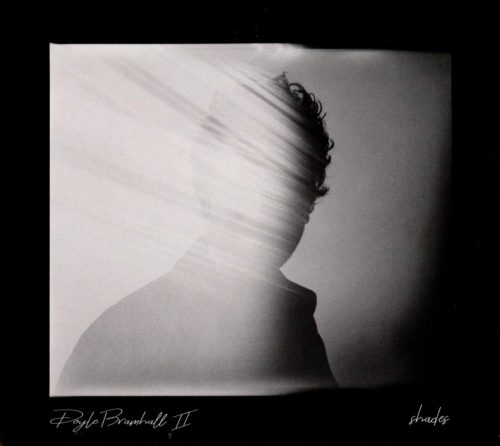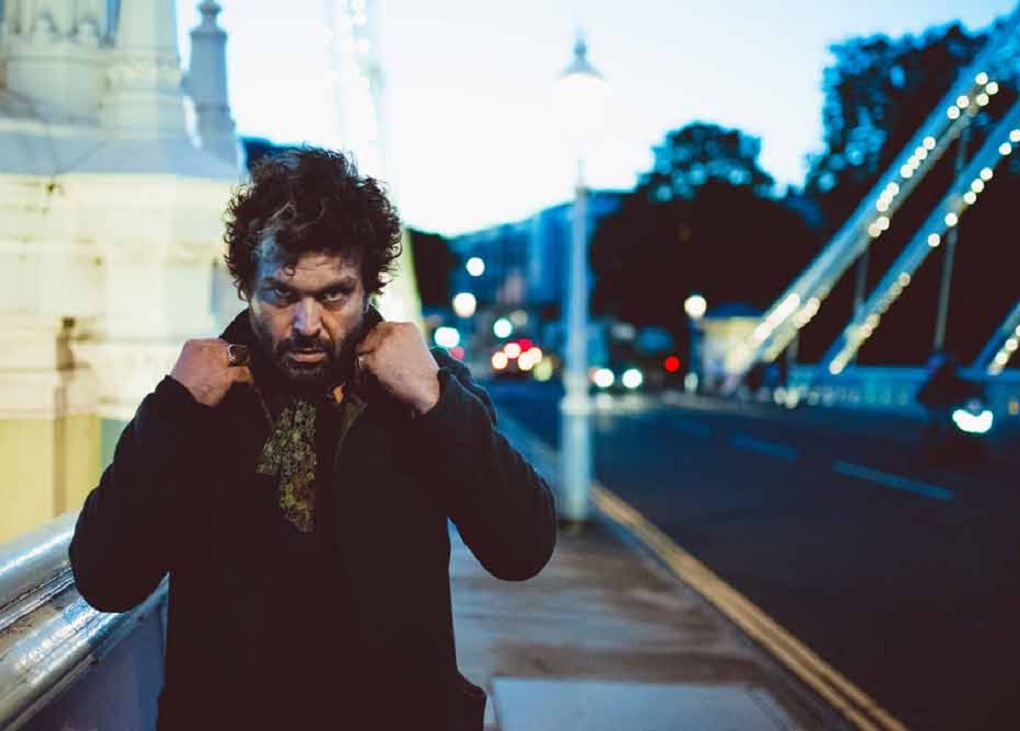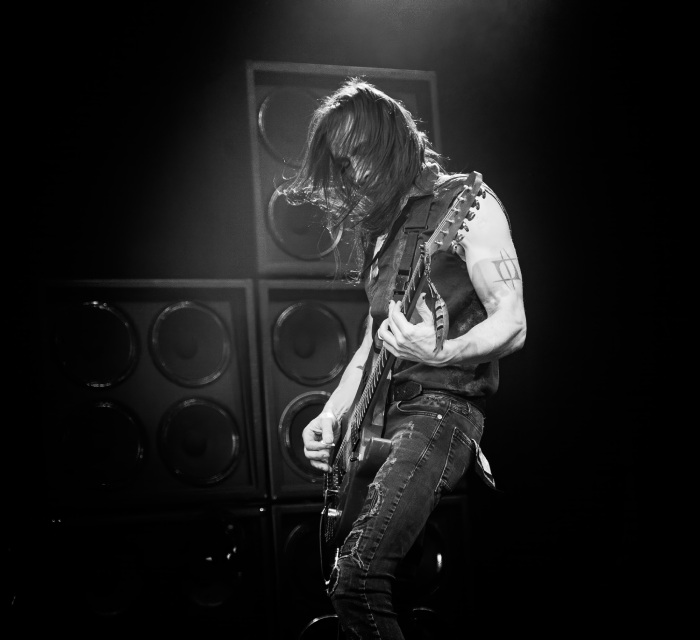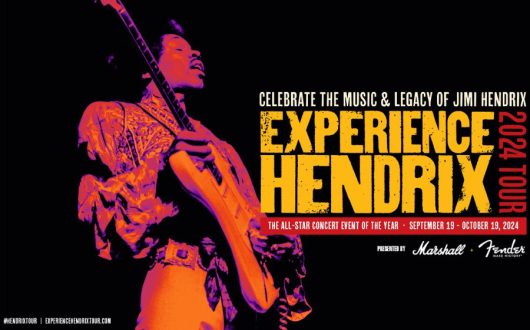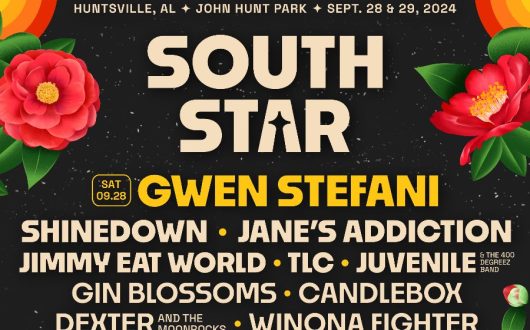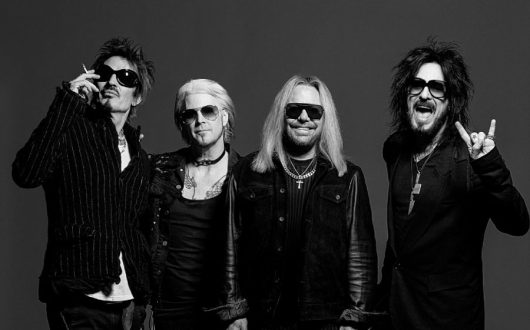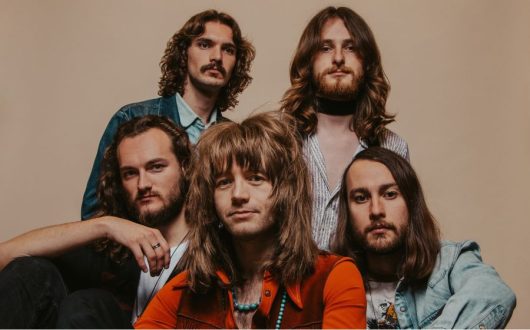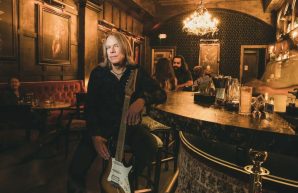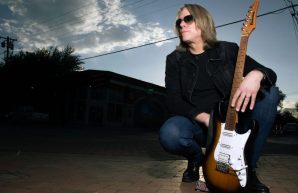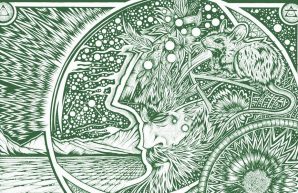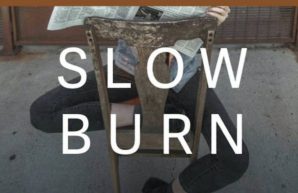Interview by Adrian Hextall
With his songs getting rave reviews in the press, Doyle Bramhall II, Eric Clapton’s right hand man for so many years has just released a new music video called ‘Love and Pain’, taken from his recent ‘Shades’ album
We spoke to Doyle about his latest album, playing with one of the most well known guitarists in the world and why a trip to Kent, UK in 2019 might just be a good thing for everyone. The link below takes you through to a copy of Shades that can be streamed or purchased.
Adrian: You’ve recently completed a busy press day in London which whilst very busy was a great example of what your label, Mascot Label Group and Provogue Records does for their artists. It feels like the perfect home for you and the music that you play these days, it’s a perfect fit I think.
DB: I haven’t experienced a record company this good and I can’t remember since the ’90s. It’s a really amazing run so far and I’m really, really excited to be on this label. I think they’re killing it.
Adrian: You are surrounded by similar artists to yourself, blues artists, a mixture of them, people from around the world. Looking at your biography as well, that seems to be what you’ve grown up with. The roster at Mascot could easily be the collective people that you’ve grown up with over the years right back from when you first started to play.
DB: I don’t actually know who’s on the roster. I know that I met with the label in New York and just really loved everybody there and the relationship is there. They’re really perfect for me and I haven’t felt that supported by a label ever really, so that’s pretty great.
Adrian: Tell me a little bit about the history of you as an artist then, because looking at who you started off playing with right back in the early days, you’ve been exposed to this sort of music very much from almost day one.
DB: It was very much in my family. My father and my uncles and cousins all moved from Dallas where they were from, with the Vaughan family, which was Stevie Ray Vaughan and Jimmie Vaughan and a bunch of other people, a bunch of other musician from Dallas.
We all moved down to Austin when I was one year old and because my mom and dad were 19 when I was one year old. My dad was starting to play shows and sort of paved the way for a lot of the Blues scenes that was happening in Austin Texas at that time. He was also going out to clubs every night listening to anybody from Leon Russell, Freddie King, Albert Collins to Linden Hopkins and many different blues masters of that day. A lot of times I would go out to to the shows with them. He would take either me or he take my mom and me, and we would just go out and I would be around that and listen to music three or four times a week at least.
Until the time I was almost six, I was in clubs listening to music, so I really grew up in it fully. For me, when Stevie Ray Vaughan who was always just Stevie to me, when he became a really big and iconic artist that he became, it was just such a different thing because a year before he made it, so to speak, he was staying with his band in my step grandmother’s house. All just sleeping on the floor and just hanging out, so he was just our buddy. It was pretty amazing to see the transition from that into what he would become one of the most iconic blues guitarist of all times.
Adrian: There’ll be a lot of people out there in the world as well that would be very jealous to think that you’ve had that opportunity and that experience in growing up because it’s a wonderful part of music history. That time where music sort of exploding on the scene as well to what it’s obviously become in the year since as well.
DB: That was a lot of the things that people think like, “Oh man, it must have been a dream come true” or whatever but that was just my life. That was what I grew up in. That was very normal for me. It was a culture almost. It was like being raised the gypsy in Romania or something. That was just your life that you’ve grown up with in Austin Texas.
Adrian: The influence people have had on you from such an early age. You were never going to escape it if you were in all of those clubs from the ages of one through six.
DB: It could have gone a couple of different ways I guess, but I didn’t end up at least going into a monastery and leading my life as a monk which I could have from it. I could have been like, “I don’t want anything to do with this blues music. Stop the music and let me out.”
Adrian: Obviously, over the years you’ve worked with such a number of artists as well as producing your own material. I can only assume that you’ve had people come up to you in years as well [citing you as an influence to them] because you don’t get to work with the likes of Roger [Waters] or Eric [Clapton], for example, without you having the skills that influence others.
DB: I do. It’s funny because I think almost three-quarters of the people that come out to see me and my shows are all musicians. They always say that like, “Oh, you’re the guitarist’s guitarist. You’re the musician’s musician” or whatever. I find it funny because I’ve only taken one lesson in my life. I quit because I just I played left-handed, upside down, very unorthodox way of playing. I was told that I couldn’t be taught unless I switch strings around or played right-handed. It’s just funny to think that musicians, especially like when I meet musicians that they come from like Berkeley School of Music or North Texas or these real school of musicians that like what I do. I’m always very surprised by that because I don’t come from a place of theory. I just play from the heart and what I do a lot of times is very broken to me. It just sounds more like a voice or whatever, like I’m able to to get out things. I don’t really consider myself like super proficient or whatever. It’s always interesting when I know that I’m the musician’s musician or being called that.
Adrian: I suppose that’s just about the biggest compliment you can get, isn’t it? It’s not just your fan base that comes up to you and says, “Oh, man, we love you, we’re your number one fan.” This is actually musicians that know how to play and can listen to you and appreciate so much more of what you’re doing.
DB: I guess that’s what it gives you insight into the power of spirit or someone’s spirit that this spirit can override or even out power whatever kind of technical prowess one might have that the spirit is much bigger than even that.
Adrian: I can really appreciate that. There must be some spiritual moments on stage when you play because you’ll see the reaction from the crowd?
DB: I always think that they’re sleeping but people tell me that their mouths are open and they’re breathing. [laughs]
Adrian: I think the phrase you’re looking for is lost in the moment.
DB: Or mouth-breathers, very likely. [laughing]
Adrian: Now, you talk about the musician’s musician and of course, those musicians are coming up to you, they’re playing with you on your albums as well. The current one [Shades] has got quite a few special guests playing on it and all well-known names as well.
How do you split tracks up when you’ve got such notable artists playing with you? If you have a special guest on a track, for example, you’d let them have that moment in the spotlight so that the fans know it’s them at that point in the single or the song or something like that. Is it an even split of spotlight moments and things like that?
DB: I think more for me, I think that it’s become such a novelty marketing thing to have guests on your records in general. Like that’s why I’ve never done that because I didn’t want it to be viewed as some kind of person that’s trying to do this because that’s what people do now. That’s what artists do and a lot of it comes from more about record companies trying to get whoever they can on songs because the biggest songs in the world are usually either duets or performances that have gaps on them or whatever.
Anyway, when I was in the studio, the guest performances on my record all came very organically. When I’ve finished recording everything you need and immediately after I recorded it just popped into my head that it would be really nice to play back and forth with Eric on the song [Everything You Need]. I thought that he would really, really like that song. I just tempted, I asked if he could play on it and this is what I wanted to capture with him and I do a lot together when we’re playing live or rehearsing or what we do together. I just wanted to capture that on a song and I thought that would be a really great song to do it on.
Then as far as the ‘Searching for Love’ with Norah Jones was a song that I wanted to write with her, to really get her sensibility in songwriting and her musicianship and the way she sings. I wanted her to do what she does with me on the phone where I’m doing what I do as well. We were able to come up with a song where I feel like it’s one of the great songs on the record for me. That is just a really, really natural song and it feels that way when I’m doing it live. It’s just so natural that it just feel like it plays itself. It’s really beautiful for me.
Then with Derek and Susan Struck, that was a song that I did for a Greg Holman tribute show in New York City. I was asked to do that particular song which was about Dylan’s song. After I finished playing it, it had such a really, I don’t know, it felt so powerful and such a sweet moment, almost a tribute for Gregg Allman who had done that on his last album, that I thought it would be a really nice tribute just to cut that on my record. I was actually supposed to go down to do some writing with Derek [Trucks] and Susan’s [Tedeschi] for their album. I just thought it would be perfect for the sweet tribute for Gregg Allman especially being that Derek had grown up with Gregg and had such a lineage with that.
Then the one in Texas with the Greyhounds [Live Forever on the album] that came very naturally. I was in Austin hanging out close to their studio and we ran into each other and I was a fan of what the Greyhounds do. I said, “It’d be great if we could come up with something.” I had told them that I was working on my record and he was like, “Well, come in the studio.” The next day we just follow up a couple of dudes, went in the studio, recorded the song and that was it. All the guest performances just came about as I was going along. It wasn’t premeditated.
Adrian: You mentioned the Greyhounds on there as well. Tell me a little bit about them because I love the description that comes with that particular track about it being recorded ‘Austin Style’. What makes Austin Style? I like that, it’s a great phrase.
DB: Well, I guess in the situation like the Greyhounds, I guess those guys are about ten years younger than me. Apparently, according to Andrew [Trube] who is one of the main singers and writers in the Greyhounds, he said he grew up listening to my band in the ’90s, the Arc Angels and that he was a fan of what we did. He remembers being a kid listening to us and digging us or whatever. The Austin Style of experience was that they’re an Austin-based band and they’re a part of the Austin culture. The studio that they worked at is in East Austin. There is a courtyard in back of the studio and the other side of the courtyard is where my sister’s hair salon is. She’s a singer. She has been singing with Jimmie Vaughan and his band on his tours and stuff, but she’s also an amazing hair stylist. I was getting my hair cut one day and then all the musicians go to her hair salon to get their haircut.
Then so everything sorts of happened in that courtyard where it’s like there’s a coffee house and then people hang out, and then there’s musicians and all kinds of people, creative people that are getting their haircut from my sister. Then there’s Buzz recording studio with the Greyhounds.
Usually, it’s like everybody just hangs out in that courtyard and on their breaks and just talk and hangs out and have coffee. Then there’ll be like just this guy Sam Greyhorse, who’s this Native American fellow who will ride into the courtyard on horses and mules and then he’ll ask if anybody wants to go on the ride. Then you’ll get on a horse and take you on a journey for a couple of hours on horses downtown in Austin and into the countryside.
It’s pretty cool. It’s a pretty relaxed like I don’t know, like you know what? We used to call them hippies. I do feel like every time I’m in Austin, it almost feels because I live in Los Angeles where the pace is really hectic. In London, the pace is really hectic too.
Adrian: Oh, yeah. [laughs]
DB: When I go to Austin, every time I go there it feels like my DNA just relaxes. It’s just so chilled out. It’s really cool but you’re allowed just to be your creative self and relax. Even though there’s a lot of commerce and a lot of things going on there and it’s a booming city that’s growing so much, it still has this such a relaxed thing. You just want to hang out all the time.
Adrian: That’s one of the things I really got from the album. It’s that really sort of calming at times on the album. For the listener its the perfect balance between a chilled New Orleans club and an energised Music Festival. You seem to found that balance very well.
DB: Well, hopefully, that is all happening naturally. because I don’t think obviously you can’t create that consciously. It emulates that, it sort of flows out of you naturally.
Adrian: I’m thinking who else could do that and perform in this environment. The only other artists that springs to mind at the moment is Beth Hart, where she can easily do the lounge environment and also easily rock it up in front of a classic rock festival, for example.
DB: Right, yeah. She has that sort of crossover kind of thing definitely. I just grew up with a very diverse background. I grew up in the bar scene in Texas listening to blues and old-school rock and roll, and psychedelic music and singer-songwriters and country music and whatever was going on in Texas but then I also was raised on classical music and flamenco music, Spanish music and even Egyptian music. When I started buying my own records I got into Egyptian music and then discovering music, ancient music and whatever from around different parts of the world. My taste is very broad, I would say. Even though I do tend to listen to the older types of music but it is art. I just love art. I think that the art of music has deteriorated I think because of how marketing has taken over in music.
Adrian: Definitely. At least you got the opportunity then to put it back out there the way it should be.
DB: I think that was like, I remember Joni Mitchell saying and this was like probably 15 years ago, she started out 20 years ago. She felt like, “The ‘mus’ in music had been taken out, and once the ‘mus’ was taken out all you’re left with is ic!”
Adrian: [laughs] I like that. That’s a fair explanation of the way it’s going in some cases definitely. In terms of live events and whatever in support to the album, when are we likely to get you back? It feels like you’d be a natural fit for something like Ramblin’ Man Fair Festival in the UK in the summer.
DB: Yeah, I would love to do that because the other thing is I want, that’s exactly the kind of thing that I would love to be on because it’s about the music. It’s about different genres of music. It’s about just good music, hopefully, and because I can always play my own shows over there but it would be nice to be in front of a broader audience. Because there could be people at the country stage that are passers-by. They hear something that strikes their fancy and all of a sudden I have other people that were there that didn’t know about me, that would be into my music and didn’t even know it. I love those kinds of festive, I love those idea of that kind of festival that is just sort of crossing over, just music, music of all times.
Adrian: There is another link as well as Gregg [Allman] played the first year as well.
DB: Nice. It sounds perfect. Let’s make it happen.
Who knows.. maybe we’ll get the man that Eric Clapton and Roger Waters go to when [they] need a guitarist !
Shades is available now: http://smarturl.it/MLGDoyleB
–
